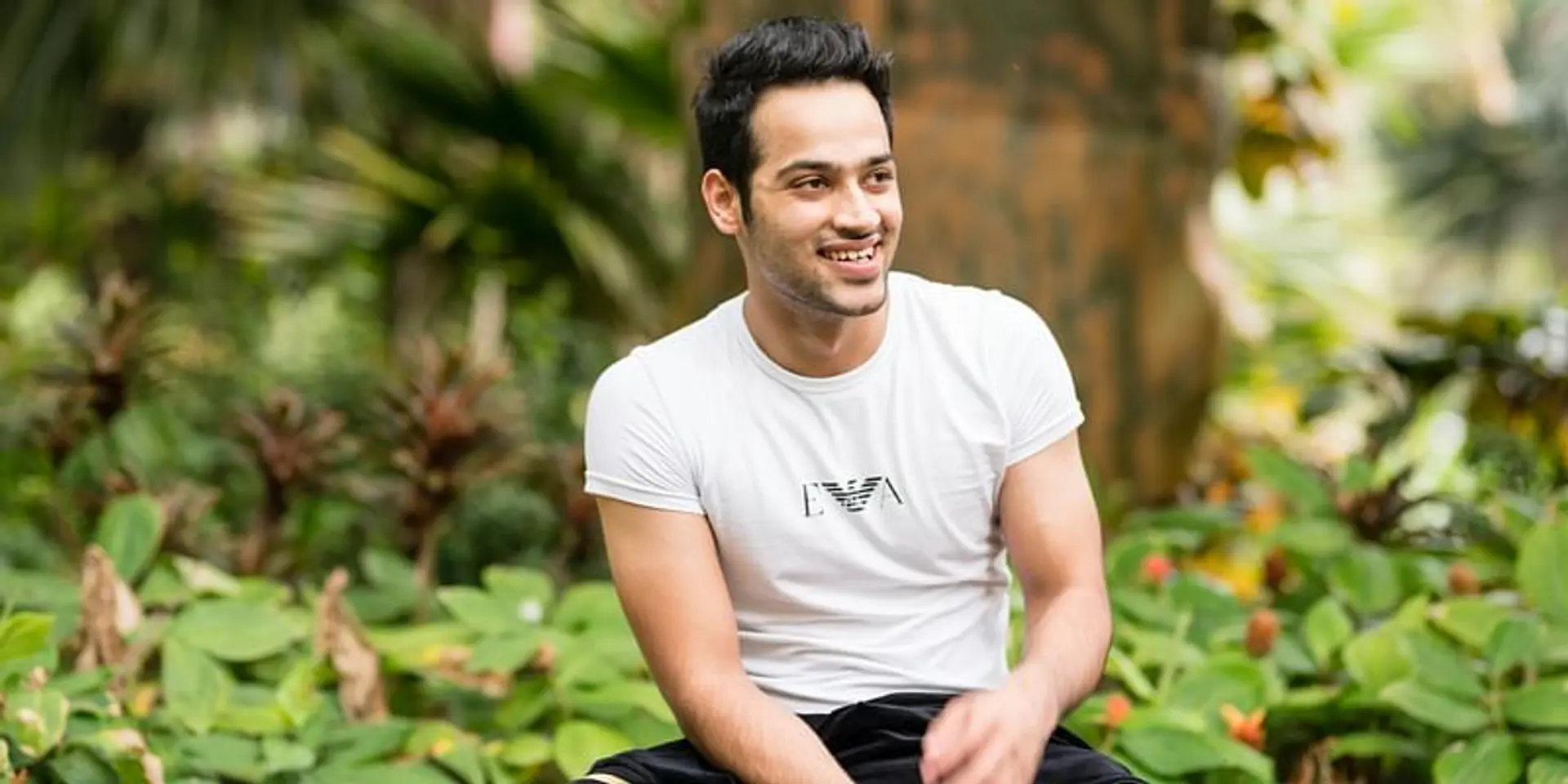This 24-year-old sold soaps door to door. Now he runs a company with a Rs 200-Cr turnover
Financial difficulties in the family pushed Raj Shamani into business at 16. Now he runs Shamani Industries and is also a public speaker and Instagram content creator on business.
Raj Shamani was 16 when his father suffered a diabetic attack and his business started going downhill. The family’s financial situation was such that meeting day-to-day needs and healthcare expenses became arduous. Raj couldn’t think of anything else but help his family in some way.
But it wasn’t that simple.
Since childhood, Raj had a problem speaking in public and he didn’t do so well academically. Studying hard to get a job seemed a difficult prospect for him.
Raj’s father traded in chemicals, which are used to make soaps and detergents. The best Raj could think of was to make and sell soaps.
Now 24, Raj is one of the youngest entrepreneurs in India with a Rs 200-crore turnover company, after having started out with making soaps at home in two buckets and going door to door to sell them.
Raj is also a speaker on money and branding matters and a business content creator. He talks to SMBStory about his journey so far.
Humble beginnings
Raj’s grandfather, father, and uncle came to Indore from Rajasthan in the early 1980s in search of work. He recalls the time his family was going through a tough time, with the only income coming from his father selling coconut on the streets.
Sometime later, Raj’s grandfather and uncle started working in a soap factory, while his father sold them in the market. Eventually, they decided to make soaps at home. They had made contacts in the business and knew from where to procure the materials.
In 1990, Raj’s father launched a dishwasher brand, Jadugar. Gradually, the family became financially stable.
“My parents went through a lot of hardships but as the business grew, the family situation improved,” says Raj. “By 2003, we had our own house and my father started a chemical trading business as well, supplying to soap manufacturers in the country.”
However, the business was adversely affected in the 2008 recession. While his father was enduring the trying circumstances, his diabetic attack in 2013 hit the family hard.
It was time for Raj to shoulder the financial responsibilities.
“I was not inclined towards education and had problem speaking in public. Studying hard to get a job was out of the question. I just had one choice: support my family financially. The only way I could do that was by starting a business.”
Raj decided to venture into the same industry as his father had.
He borrowed Rs 10,000 from his father and bought the raw materials. The other thing he did was take the help of the internet.
“I watched many YouTube videos to understand the soap-making process and implemented them,” says Raj. “I took help from my father on how to make foam and balance the pH level, among other things.”
A little research on market trends showed Raj that liquid-based soaps were an emerging category, with Vim and Pril the top brands in Indore. He decided to focus on making a liquid dishwasher.
“Vim and Pril were priced at Rs 110 for 500 ml; my product cost Rs 45 for the same quantity,” he says. “I didn’t compromise on quality.”
Raj approached families and grocery stores in nearby localities with his product and gave them the demonstration himself.
Shortly afterwards, he launched the product with the name Jadugar Drop in 2013.
Business acumen
For any established brand, overhead costs such as branding, packaging, and logistics push up the retail price of its product. However, Raj’s focus was not so much on profit margins as he was only targeting local shop owners. He planned to take a 12-15 percent profit margin on the product.
He got around 250 bottles of the product ready between March and July 2013, when he passed his intermediate exam. He sold 100 bottles to grocery stores and distributed another 100 among his friends when he joined college in July.
Instead of giving free samples in sachets — as is the practice when a company wants to familiarise potential customers with a new product — Raj distributed 500 ml bottles.
“When you give small sachets, chances are people would throw it away or not use it. But when you have something like a 500 ml bottle, even if you don’t use it immediately, you wouldn’t discard it or may even use it,” explains Raj.
After a few days, Raj sought his friends’ feedback and asked them to connect him with their mothers. He started talking to each one of them and created a customer base.
“I pitched them that if they purchase five litres I’d give them a 25 percent discount. Most of them agreed. I sold the product and got the money to expand.”
This sales strategy seemed to work as Raj says several housing societies in Indore started using the Jadugar product.
This initial success spurred Raj to start a multi-level marketing business, as part of which he approached housewives, who wanted to become financially independent, and introduced them to entrepreneurship.
“I collated data about housewives in various societies who wanted to earn money,” he says. “I conducted a meeting with them and told them to spread the word about my product. I promised to give them 25 percent off the price on whatever they would sell.”
Raj carried out this scheme in 17 societies, which eventually gave his soap business a lot of traction. A local newspaper even published an article about how he was financially empowering women. His products found a place on the shelves of a majority of the local shops.
Going in new directions
Within a year of starting the business, Raj says he achieved profitability. In 2015, he represented India at a youth representative programme at the United Nations. By 2016, Raj started giving public talks globally. He has addressed organisations such as Jaguar Land Rover, , , and Forbes in 26 countries.
He has spoken at TedEx conferences and is one of the youngest business content creators on Instagram from India.

Shamani Industries' products
In 2015, Raj merged his father’s chemical trading company with his own business. The merged entity, Shamani Industries as a whole, posted a turnover of Rs 200 crore in FY 20.
The company’s product portfolio has grown to 16, which includes dishwashing liquid, soap, detergent powder, toilet cleaner, floor cleaner, and sanitiser. It has a strong presence in Indore and nearby areas.
Raw materials such as labsa, soda, salt, alpha-olefin sulfonate, and sodium laureth sulfate are sourced from companies including Tata, Nirma, and the Aditya Birla Group.
Shamani Industries is also a contract manufacturer for Info Edge-backed ShopKirana and is in talks with other companies.
Local is the way forward
One of the biggest challenges for Raj’s business is the entry of companies established in other sectors into the FMCG market and exiting it after a short period. This, he says, hampers the health of the market.
“Brands come in like seasons for a year or two and try to flood the market with offers because they have deep pockets,” he says. “Most MNCs think FMCG is the way forward in the wake of the COVID-19 induced lockdown, as homecare products were included on the essential list. But I don’t think that’s the way ahead after for everyone.”
He has a different take on the competition. “I cannot be a Unilever of India, but I can be a Unilever of my city or my area,” he says. “I don’t want to miss this chance. I believe in first getting my brand a strong foothold in the local and nearby rural and semi-rural areas.”
Expanding steadily
Raj plans to deepen his brand’s penetration geographically and expand its reach steadily.
“The pandemic has taught us that it’s always useful to have a strong presence wherever the business is present. We are going forward steadily and rather than expanding into states or cities, we are going kilometre-wise. Our target is to expand our reach to 500 km soon.”
This means the brand is looking to expand to neighbouring Rajasthan, Gujarat, and Uttar Pradesh, he says.
The company is also planning to add more qualitative products in the household category by leveraging its supply chain and distribution network.
The young entrepreneur is also looking to invest in early-stage FMCG startups.
“I started the business to be financially independent, but today it is much more than that,” he says. “It is about raising the game for household brands.”
Edited by Lena Saha









